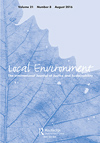-
When Is Conflict Positive? And How Climate Change Might Exacerbate Ethnic Violence
August 26, 2016 By Cara Thuringer Conflict is typically viewed as a failure of social and political systems and almost never as a method of transforming dysfunctional or fractured societies into cohesive units. However, in an analysis of the discourse around climate change and conflict in Local Environment, Melissa Nursey-Bray concludes that conflict is a sometimes-necessary step in a complicated process to create stable societies. Nursey-Bray separates the climate-conflict discourse into two baskets: climate change as a security risk and climate change as one of many factors that contribute to insecurity. Those in the first camp typically take a view of conflict as “almost always negative, causing or magnifying violence, and constructs adaptation as a positive and appropriate response.” The second framing allows for a more critical interpretation of how conflict arises and its role in society, but generally still sees conflict as something to be resolved. She suggests a “re-focusing of the discourses about conflict in a way that embraces its capacity to be part of the process within adaptive governance, rather than trying to resolve and define it, will make it inherently transformative and help build rather than weaken new and stronger institutions and adaptation outcomes.”
Conflict is typically viewed as a failure of social and political systems and almost never as a method of transforming dysfunctional or fractured societies into cohesive units. However, in an analysis of the discourse around climate change and conflict in Local Environment, Melissa Nursey-Bray concludes that conflict is a sometimes-necessary step in a complicated process to create stable societies. Nursey-Bray separates the climate-conflict discourse into two baskets: climate change as a security risk and climate change as one of many factors that contribute to insecurity. Those in the first camp typically take a view of conflict as “almost always negative, causing or magnifying violence, and constructs adaptation as a positive and appropriate response.” The second framing allows for a more critical interpretation of how conflict arises and its role in society, but generally still sees conflict as something to be resolved. She suggests a “re-focusing of the discourses about conflict in a way that embraces its capacity to be part of the process within adaptive governance, rather than trying to resolve and define it, will make it inherently transformative and help build rather than weaken new and stronger institutions and adaptation outcomes.” Ethnic fractionalization has long been understood as a major contributor to the outbreak of armed conflict. A new study published in PNAS, by Carl-Friedrich Schleussnes, Jonathan Donges, Reik Donner, and Hans Joachim Schellnhuber, examines how such risks interact with climate-related natural disasters. At the country scale, the authors find that 23 percent of conflict events sampled between 1980 and 2010 coincided with climate disasters. Globally, drought and heatwaves have a “coincidence rate of 9 percent regarding armed-conflict outbreak and disaster occurrence.” The authors analyze climatological, meteorological, and hydrological disasters of various magnitudes as measured by impact on GDP and the rate of coincidence with armed-conflict in ethnically divided regions. This separates it from similar literature that analyzes temperature and precipitation variances and conflict outbreaks. The authors qualify that this does not mean that climate-related disasters are conflict triggers, but rather that the effects of these events seem to contribute to inflammation of preexisting tensions between ethnic groups.
Ethnic fractionalization has long been understood as a major contributor to the outbreak of armed conflict. A new study published in PNAS, by Carl-Friedrich Schleussnes, Jonathan Donges, Reik Donner, and Hans Joachim Schellnhuber, examines how such risks interact with climate-related natural disasters. At the country scale, the authors find that 23 percent of conflict events sampled between 1980 and 2010 coincided with climate disasters. Globally, drought and heatwaves have a “coincidence rate of 9 percent regarding armed-conflict outbreak and disaster occurrence.” The authors analyze climatological, meteorological, and hydrological disasters of various magnitudes as measured by impact on GDP and the rate of coincidence with armed-conflict in ethnically divided regions. This separates it from similar literature that analyzes temperature and precipitation variances and conflict outbreaks. The authors qualify that this does not mean that climate-related disasters are conflict triggers, but rather that the effects of these events seem to contribute to inflammation of preexisting tensions between ethnic groups.Sources: Local Environment, PNAS.
 A Publication of the Stimson Center.
A Publication of the Stimson Center.





